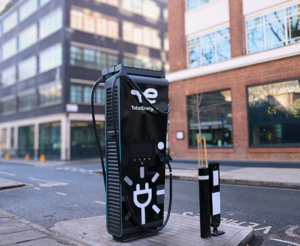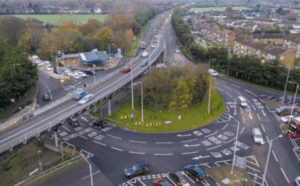TfL is working with the boroughs to create additional parking spaces for dockless rental bikes and e-scooters to enable more people to use the schemes safely
TfL has written to dockless e-bike and e-scooter operators to ask them to work with it to tackle issues caused by problematic parking
Enforcement action will be taken against operators who do not ensure compliance with new policy
These changes will ensure the schemes can continue to operate and provide access to micro-mobility for Londoners, while maintaining safe pavement spaces for all
Transport for London (TfL) has set out a new approach for dockless rental e-bike and e-scooter parking on its roads, London’s network of red routes. The updated enforcement policy, alongside significant investment in new parking spaces, will help schemes continue to operate, while ensuring streets remain safe and accessible to everyone. The approach will predominantly focus on dockless e-bikes, as London’s e-scooter trial already requires parking in bays, with controls in place to ensure compliance.
Dockless rental e-bikes and e-scooters are an important part of London’s transport network, helping people get around sustainably and connecting them to other transport modes. However, problematic parking of the vehicles can cause significant safety issues for many Londoners, particularly disabled and older people, and these issues have been exacerbated by recent increases in fleet sizes.
On much of TfL’s network of red routes – some the busiest roads in the capital – rental e-bikes are often being parked on the pavement in a way that negatively impacts pedestrian and wheelchair access. To ensure that these roads remain open and welcoming for everyone, TfL has written to operators to ask them to collaborate on its new enforcement policy for e-bikes. TfL will also be working closely with London’s councils to improve parking compliance.
The new policy sets out that TfL will consider taking action against operators who allow their bikes to be parked outside of designated places on red routes and on TfL land, which includes areas such as station forecourts and bus garages. Rental e-scooters are already required to park in bays, and the new policy will bring e-bikes closer in line with this.
A proportionate and pragmatic approach will be taken to any enforcement activity, initially focused on the most problematic areas where large numbers of poorly parked bikes are causing access or safety issues. Operators are ultimately responsible for ensuring their bikes are deployed and parked bikes appropriately. Any enforcement action would be targeted towards operators who do not ensure these rules are complied with, but TfL is also encouraging all dockless e-bike users to consider the impact of their parking on other road users and comply with local parking requirements.
To ensure that dockless e-bike and e-scooter schemes can continue to play an important role in a safe and sustainable transport network, almost £1 million has been allocated this year to boroughs to fund 7,500 new parking spaces. This is in addition to the 2,000 parking bays already delivered by boroughs. On red routes, TfL plans to deliver at least 800 spaces by next summer and is targeting a network of 3000 spaces by the end of 2026. The new enforcement policy, alongside investment in safe and appropriate parking, will help these services operate in a way that protects the rights of all Londoners to use and enjoy the capital’s streets.
While this action is a London response to the issues raised by stakeholders in relation to dockless rental schemes, TfL is also raising with the Government the potential to address these issues in the longer term through new powers for strategic transport authorities to regulate and manage these services.
Walking and Cycling Commissioner Will Norman said: “Dockless e-bikes play an important role in encouraging more people to choose sustainable modes of transport when travelling around the capital, but we know that poor e-bike parking can cause significant safety issues for some Londoners, particularly disabled and older people. In some instances they have become obstacles for pedestrians, particularly in busy parts of the capital.
“The Mayor’s million-pound investment into additional parking spaces, in conjunction with this scheme to ensure that vehicles are parked responsibly, will make London safer and more accessible for everyone. I look forward to working with councils, as well as e-bike operators on these improvements.”
Cllr Kieron Williams, London Councils Executive Member for Climate, Transport and Environment, said: “Dockless e-bikes have the potential to be a major positive step forwards for London, but to work for our city they need to work for all Londoners. Whilst the large majority of people using the bikes do so with care and respect for their fellow residents, we are still seeing far too many blocking pavements, roads and crossings.
“London boroughs are already using enforcement powers to tackle these problems, including installing almost 2,000 new parking bays. We will be working closely with TfL to learn from their new approach, so we can continue to use all of the legal tools currently at our disposal to address these issues for our residents.
“The right long-term solution is new legislation, setting out fair and consistent rules that all operators have to abide by. However ahead of that, it is clear the current operators could and should be doing much more to address these problems. I hope this welcome move by TfL today will lead the operators to do more, working with us fix these problems so we can make dockless e-bikes a success”.
Claire Mann, TfL’s Chief Operating Officer, said: “Rental e-bike and e-scooters are an important part of the capital’s transport network and we want to make sure they work for everyone. Our new approach to enforcement on our red routes, alongside investment in new parking spaces, will ensure that e-bikes and e-scooter services can continue to operate without impacting the ability of others to use and access the capital’s streets. We want to work alongside operators to enable this to happen and will continue to work with operators, boroughs and other partners to ensure all Londoners have access to a safe and sustainable transport network.”
Clive Wood, from the Charity Guide Dogs, said: “We welcome TfL’s updated enforcement policy for dockless e-bikes and e-scooters. For blind and partially sighted people having pavements that are clear of clutter, including poorly parked rental mobility vehicles, is vital to be able to get from A to B across the capital independently and with confidence. We have heard from many vision impaired people in London that they have to try and navigate around inconsiderately parked rental e-scooter and e-bikes on a regular basis. An experience I can recognise. Introducing additional parking spaces will help to tackle the increasingly frustrating issue. I hope operators will work with TfL to ensure the updated policy makes a difference”.
























